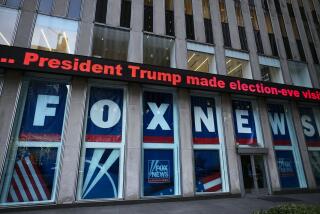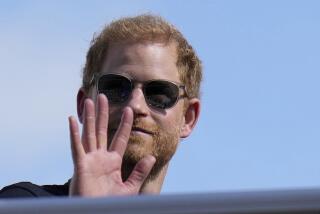Philip Morris Loses Lawsuit
- Share via
Tobacco giant Philip Morris USA suffered an immense defeat Friday when an Illinois judge ordered the company to pay $10.1 billion in damages for misleading smokers into believing that low-tar cigarettes are safer than regular brands.
The verdict, which Philip Morris said it would appeal, marked a successful start for a new line of legal attack that could embroil cigarette makers in class-action cases for years to come.
Nearly identical lawsuits have been filed in 11 states against top cigarette makers, with more on the way. Each claims that the companies violated state consumer protection laws by failing to deliver on a promise of lower health risks with “light” cigarettes.
Four of the pending cases have been granted class-action status -- two against Philip Morris and one each against R.J. Reynolds Tobacco Co. and Brown & Williamson Tobacco Corp.
RJR and B&W; face trials in the same venue -- the circuit court of Madison County, Ill., near St. Louis -- where Philip Morris on Friday suffered its defeat.
Judge Nicholas Byron ordered the company to pay $7.1 billion in compensatory damages to reimburse about 1.1 million Illinois consumers who bought Marlboro Lights and Cambridge Lights in recent decades.
Byron also ordered Philip Morris to pay $3 billion in punitive damages to the state. He set aside 25% of the compensatory award, or $1.75 billion, for attorneys’ fees and expenses.
The damage award is believed to be the second-largest in a class-action case -- behind the $144.8-billion verdict against cigarette makers in the Engle case in Florida, which is on appeal.
Plaintiffs’ lawyer Stephen Tillery said he was pleased by the ruling, which followed a non-jury trial that lasted nearly two months.
“I think the evidence in the case was overwhelming ... that ‘light’ cigarettes not only are as bad as regular cigarettes but are actually worse for the smoker,” Tillery said.
Philip Morris immediately denounced the verdict.
The company’s initial challenge will be to either post, or modify, the $12-billion appeal bond ordered by the judge. To pursue an appeal, a defendant must post a bond to cover the judgment, plus interest, in case the appeal fails.
“Judge Byron has awarded an outrageous amount of money to a group of smokers ... who are not injured and who never bought a pack of Marlboro Lights cigarettes that didn’t have a health warning,” said William S. Ohlemeyer, vice president and associate general counsel for Philip Morris USA.
“We’re going to spend the next 30 days asking an appellate court to enter an appropriate order that allows the appeal to go forward without requiring us to post a $12-billion bond,” he said.
With the case winding toward an expected plaintiff victory, Illinois lawmakers several weeks ago began considering legislation to cap appeal bonds at $25 million, though no final action has been taken.
The fallout from Friday’s verdict is uncertain, and it is unclear whether a bond cap passed in the coming days could apply retroactively to Friday’s verdict.
The Campaign for Tobacco-Free Kids, a leading anti-smoking group, cheered the verdict, calling the penalty severe but warranted by the “tremendous toll in health, lives and money that has resulted” from Philip Morris’ “wrongful marketing and sale of light cigarettes.”
Unlike traditional cases, the “light” suits do not seek damages for smoking-related illnesses.
Indeed, sick smokers are specifically excluded from the class. The plaintiffs claim instead that they did not get what they paid for, because light cigarettes are not safer.
Central to the case was the concept of “compensation” -- or the tendency of smokers of “light” cigarettes to regulate their nicotine dose by smoking more cigarettes or puffing more deeply or more often to make up for the weaker nicotine content. The result is that the presumed advantage of less tar is reduced or eliminated.
Beyond that, plaintiffs also presented company documents and independent test results showing that levels of numerous harmful compounds in smoke from “light” cigarettes actually are higher than in regular brands -- apparently because the ventilation used to reduce tar deliveries results in less complete combustion of poisons in the smoke.
Philip Morris, the plaintiffs said, was well aware that the promised benefits of “health reassurance cigarettes” would not be realized but kept this to itself.
The company said it never claimed that “light” cigarettes were safer.
It also noted that health authorities until recently had advised smokers who could not quit to switch to low-tar brands.
Moreover, the company argued, Marlboro Lights and Cambridge Lights always have carried the same health warnings as all other cigarettes.
According to the company, to many smokers the label “lights” merely signifies a less harsh taste, not reduced risk.
In fact, because smokers differ in their knowledge and impressions, the case never should have been tried as a class action, the company said.
Philip Morris is hoping that remarks by the judge during the trial may be helpful in its appeal.
On March 10, before the closing arguments, Byron ticked off a list of charities and causes he hoped might share in any damage award. He mentioned law schools, legal aid societies and the American Cancer Society.
“Domestic violence has been one of my favorite programs,” he said, “and I would like to include them somehow.... Now, that is in the event I reach a judgment for the plaintiffs.”
Friday’s ruling did, indeed, specify that money not claimed by class members be divided among such groups.
Before the verdict, Ohlemeyer called the judge’s remarks “rather scandalous,” saying that “it says a little bit about the way the system works out there.”
But afterward, plaintiffs’ lawyer Tillery defended Byron’s conduct as “very straightforward and square,” adding that Philip Morris is “going to have a helluva time convincing a court of appeals that he was unfair to them.”
The judge’s ruling came after the stock markets closed. In after-hours trading, shares of Altria Group, parent of Philip Morris, plunged to $33.50. They had risen 75 cents to $35.04 in regular New York Stock Exchange trading.
More to Read
Inside the business of entertainment
The Wide Shot brings you news, analysis and insights on everything from streaming wars to production — and what it all means for the future.
You may occasionally receive promotional content from the Los Angeles Times.










